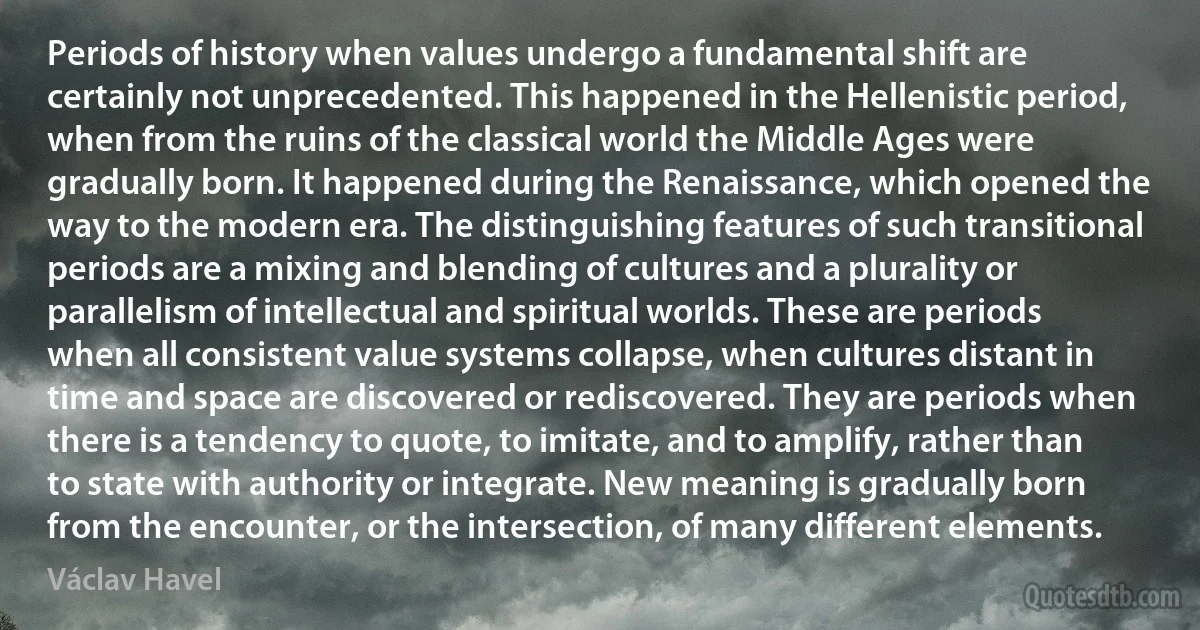
Periods of history when values undergo a fundamental shift are certainly not unprecedented. This happened in the Hellenistic period, when from the ruins of the classical world the Middle Ages were gradually born. It happened during the Renaissance, which opened the way to the modern era. The distinguishing features of such transitional periods are a mixing and blending of cultures and a plurality or parallelism of intellectual and spiritual worlds. These are periods when all consistent value systems collapse, when cultures distant in time and space are discovered or rediscovered. They are periods when there is a tendency to quote, to imitate, and to amplify, rather than to state with authority or integrate. New meaning is gradually born from the encounter, or the intersection, of many different elements.
Václav HavelRelated topics
authority born blending classical different distinguishing era fundamental history intellectual intersection meaning middle mixing parallelism plurality renaissance space state tendency time value way worldRelated quotes
.. I will endeavour to make clear to men of good will what the word 'material' means with regard to painting and that, without the material substance of paint, a painting is not a work of art but merely a decorative object, or rather, if it deals with an invented painting, the value of the image resides in its spiritual content.
In order to be a work of art, a painting must be very well painted and the good quality of the paint depends completely on the material substance of the paint with which it is executed. This matter, which constitutes the substance of painting, is composed of two elements which are equally important and absolutely inseparable: physical substance and metaphysical substance. These two elements complete each other reciprocally and when they are of a superior quality, create a masterpiece by way of their absolute harmony.

Giorgio de Chirico
The first intellectual operation in which I arrived at any proficiency, was dissecting a bad argument, and finding in what part the fallacy lay; and though whatever capacity of this sort I attained was due to the fact that it was an intellectual exercise in which I was most perseveringly drilled by my father, yet it is also true that the school logic, and the mental habits acquired in studying it, were among the principal instruments of this drilling. I am persuaded that nothing, in modern education, tends so much, when properly used, to form exact thinkers, who attach a precise meaning to words and propositions, and are not imposed on by vague, loose, or ambiguous terms. The boasted influence of mathematical studies is nothing to it; for in mathematical processes, none of the real difficulties of correct ratiocination occur.

John Stuart Mill
Humans are proud of themselves. The guiding principle of the modern age is "Man is the measure of all things." And our bodies have excited physiologists and philosophers to a profound awe of the basic mammalian design. But the history of the dinosaurs should teach us some humility... If our fundamental mammalian mode of adaptation was superior to the dinosaurs', then history should record the meteoric rise of the mammals and the eclipse of the dinosaurs. Our own Class Mammalia did not seize the dominant position in life on land. Instead, the mammal clan was but one of many separate evolutionary families that succeeded as species only by taking refuge in small body size during the Age of Dinosaurs. As long as there were dinosaurs, a full 130 million years, remember, the warm-blooded league of furry mammals produced no species bigger than a cat.

Robert T. Bakker
In conclusion, it appears to me that nothing can be more improving to a young naturalist, than a journey in distant countries. It both sharpens, and partly likewise allays that want and craving, which, as Sir J. Herschel remarks, a man experiences although every corporeal sense is fully satisfied. The excitement from the novelty of objects, and the chance of success, stimulate him to increased activity. Moreover as a number of isolated facts soon become uninteresting, the habit of comparison leads to generalization. On the other hand, as the traveller stays but a short space of time in each place, his descriptions must generally consist of mere sketches, instead of detailed observation. Hence arises, as I have found to my cost, a constant tendency to fill up the wide gaps of knowledge, by inaccurate and superficial hypotheses.

Charles Darwin
In her book, Philosophy in a New Key, Susanne Langer remarks that certain ideas burst upon the intellectual landscape with a tremendous force. They resolve so many fundamental problems at once that they seem also to promise that they will resolve all fundamental problems, clarify all obscure issues. Everyone snaps them up as the open sesame of some new positive science, the conceptual center-point around which a comprehensive system of analysis can be built. The sudden vogue of such a grande ideé, crowding out almost everything else for a while, is due, she says, "to the fact that all sensitive and active minds turn at once to exploiting it. We try it in every connection, for every purpose, experiment with possible stretches of its strict meaning, with generalizations and derivatives.”.

Clifford Geertz
